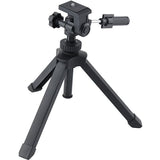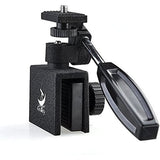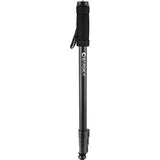Your Cart is Empty
Free shipping on US orders! 20% off your first order | Code: SkyGenius20
Free shipping on US orders! 20% off your first order | Code: SkyGenius20
Free shipping on US orders! 20% off your first order | Code: SkyGenius20
Free shipping on US orders! 20% off your first order | Code: SkyGenius20
by Genius Sky October 12, 2021 5 min read

Quick Links
Why do you need a tripod for binoculars?
How to mount your binocular to a tripod
Do all tripods fit all binoculars?
Tripod adapter for binoculars
Types of tripods for binoculars
How much does a tripod for binoculars cost?
What to look out for when buying a tripod for binoculars?
Benefits of using tripods for binoculars
Tripods are mainly used for binoculars with high magnification.
High-power binoculars are heavier. It’s impossible to hold it by hand without wobbling.
If you want to observe a certain object for a long time, such as bird watching or astronomy, a tripod is very useful and helps eliminate fatigue.
Using tripods makes your observation more pleasant, calmer, and more precise.
There are three accessories you need to mount the binoculars to the tripod.
As a rule, most binoculars will have a threaded tripod socket if their magnification is greater than 8 times.
It is usually located in the center between two barrels. The threaded socket can be revealed after removing the plastic dust cap.
A tripod adapter is needed to connect the binoculars to the tripod. It is first screwed into the exposed threaded socket on the binoculars.
Often an adapter is included in the delivery for models with very high magnification. If your binocular doesn’t come with one, you can buy the tripod adapter separately.
You can attach the standard thread to the top of tripod or onto the head mounting plate.
The first thing to focus on is how much weight the tripod can hold. If they meet the criteria of weight capacity, then yes, all tripods fit all binoculars.
Another thing you might need to pay attention to is the tripod adapter. Binoculars with roof prism require narrower adapters. Tripod adapters with small width can easily fit in the narrow space.
Most tripod adapters are 10cm high. The upper screw is attached to the binoculars. The thread located on the bottom is attached to the tripods.
Tripod adapters have a thread size of 3/8 " or 1/4". Nowadays a thread with a flank angle of 60° is used, while earlier a thread with an angle of 55° was used. But since all other dimensions are the same, both older and newer products can be used without any problems.
The screw of the tripod adapter is also universal. Thanks to the standardized dimensions, these parts always fit together.
Most tripod adapters are made of metal or plastic.
Metal is far more stable and guarantees a longer lifespan. The plastic ones are lightweight and can therefore be transported more easily.
If you go on long hikes, plastic adapters will be the better choice. Another advantage of it is the low price.
The three legs can usually be adjusted individually so that this tripod can be placed in uneven places. In addition, Its height is adjustable and can therefore be adapted to your height. Classic tripods often have a movable panorama head. Therefore, the binoculars can be tilted and fixed in all directions. The range of prices for tripods is between $25 to $1,000, depending on the material.

This tripod is significantly smaller than the classic tripod. It is set up on the table and can be carried in a small carrying case. The weight of the table tripod is usually less than half a kilo. But some of them can weigh up to 4 kilos, which is ideal for large binoculars. Table tripods are priced between $25 to $100.

Window tripods are a practical solution wherever there is no space for normal tripods. The clamps can be attached to panels, doors, car windows, high seats, pipes, branches, fences, and many other objects. You will get a very flexible tripod for almost every environment. Depending on the function and design, they cost between $20 to $80.

Since monopods only have one leg, they cannot stand by themselves, which means you have to hold them all the time.
If you make a lot of sideways movements, they are great for keeping the binoculars constantly at the same height. It’s an ideal option if you have to change position frequently. It takes up very little space and can be stowed in a carry bag. Tripods with one leg are priced between $20 to $300.

The price varies depending on quality, material, and function.
Common tripods are even available for a good $20 and come with all kinds of accessories. Often, tripods in this price range are not too stable and have a lot of plastic built around them.
High-quality aluminum tripods, on the other hand, are available for around $35-$75.
The highest quality is made of carbon. These tripods can sometimes cost several hundred dollars.
A movable tripod head will be very practical. It can be swiveled in all directions, which guarantees maximum flexibility.
The weight of tripods should be no less than the weight of the binoculars. So it can be heavy enough to give the binoculars the necessary support. At the same time, it has to be easy to transport. When you go hunting or traveling in the countryside, you don’t have to carry heavy luggage.
Some tripods can be easily adjusted in height.They can be perfectly adapted to your height while standing and sitting.
The binocular tripods are made of different materials such as wood, plastic, or aluminum. Tripods made of wood are ideal because they are particularly stable and vibration-free. The only disadvantage is the weight being slightly higher.
This factor is usually given on the product page. Check if the tripod can hold the weight of your binoculars.
Tripods are compatible with binoculars, cameras, and cell phones. Using a tripod reduces blurred images to a minimum. You can capture everything in the sharp image from the perfect viewing angle. Or you can share this fascinating view with other people.
Tripods also take away the burden of heavy binoculars. It is a great relief when you don’t have to keep the device by yourself. Arms can get tired quickly. With a tripod, you can comfortably make observations by leaving your binoculars on the tripod.
Comments will be approved before showing up.
Email-only promotions.
Directly to your inbox.